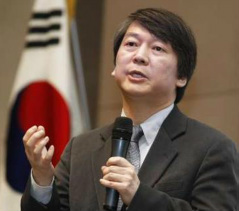The results of the past few elections, abbreviated and simplified, are as follows:
Seats in the South Korean National Assembly Won, By Election
……………[Left-Wing] .. [Right-Wing] .. [Socialist] .. [Other]
2000: ……….115…………………..152…………………..0……………….6
2004: ……….161…………………..125………………….10……………….3
2008: ………..84…………………..185…………………..5……………..25
2012: ………..127…………………..157………………….13……………….3
The “right-wing” coalition thus won the following shares of seats:
2000: 56% of seats
2004: 42% of seats
2008: 62% of seats
2012: 52% of seats
There was a back-and-forth “seesawing” in the 2000s. Then 2012 put the power-balance back where it was in 2000.
One rather high-ability 8th-grade girl (born in January 1999, so age 13 as of April 2012), wrote what I thought was a remarkably mature essay on April 12th. That was less than 24 hours after the result was in: Emotions were still raw.
Her essay, verbatim [Note that “New Frontier” is the current-name of the main “right-wing” party]:
[Essay on Korean Legislature Election Results, by 13-Year-Old Korean Girl]
The Republic of Korea had National Assembly Elections in April 2012. Many parties changed their name this year. That means to start with new promises. Also, the ability of current president became issue. According to these changing, April 2012’s election was very interesting battle.The result of this election was victory of New Frontier Party but New Frontier lost 28 seats of National Assembly. Democratic Unity Party got 43 seats even though they received less total seats. Election is a citizens’ decision so we have to agree with many people’s thinking.
However, there are disappearing result in 2012’s election. 16 seats of National Assembly for other parties. Many people’s variety suggestions will develop the Republic of Korea. Two parties’ place fighting is terrible to country. These parties people only argue.
Whether the left-wing coalition had “won” (by gaining a net of 43 seats over ’08) or “lost” (by failing to win a majority of seats) was the main object of discussion in most of these 7th-9th graders’ essays. Many discussed how much they disliked the “right-wing” party, and the then-president, Lee Myung-bak. For instance, on the night of the election, before the results were in, a student wrote: “I predict the Democratic Unity Party will win. Because people saw Lee Myung Park’s barbarities.” That last word will have been thanks to a cell-phone-dictionary.
I think this girl’s essay is more mature than all that. She is not a partisan. Perhaps hers is more mature than what most adults would come up with, in fact. If I can rephrase her last three lines: “More independent political voices is exactly what Korea needs. The two mega-parties‘ backstabbing power-politics really do nothing but weaken this society. They bicker with each other and waste time, accomplishing nothing except the demoralization of the public.”
This “spirit” (independent, anti-big-party) lost out big time in the later, Dec. 2012, presidential election, in which one product of a big party machine faced off against another. Park Geun-Hye, a big player in the “right-wing” machine, won. The other guy, who lost, was a product of the “left-wing” machine.
The latest news is that Ahn is back. He won a seat to the legislature in a special election in 2013. He may well be elected president in December 2017. If so, then the above girl essayist — whose name I have now forgotten, who will be about to turn 19 years old in Dec. 2017, and who will probably be in college at the time — may be happy. Maybe she will even remember writing that essay way back in April 2012.

